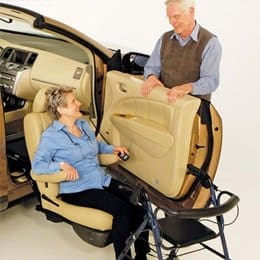When shopping for aids and equipment to make the home more accessible, buyers should be aware of a few things to consider before purchasing mobility devices. Some factors to evaluate include convenience, support, and customer satisfaction.
Making the decision to take a closer look at mobility devices and equipment is the first step toward creating a more accessible home and autonomous life. Make sure that you take time to find the right devices- and vendor- to ensure your satisfaction, utility, and overall quality of life after purchase and installation.
Some things to consider before purchasing mobility devices are:
Since adaptive equipment and mobility aids are something that you will typically use every day, it pays to put some effort into the buying process. Don’t hurry or hastily buy something because it is a great deal, but rather do your homework and put some thought into what really matters. Making thoughtful and informed decisions ensures you are as happy with your device, lift, or aid in years to come as you were when buying it!
Keep the following in mind when checking out your mobility options:
Safety first
The most important thing to think about when it comes to mobility aids is safety. Safety considerations may vary from device to device, and manufacturer to manufacturer, but there are some common-sense standards that consumers should keep in mind before buying, installing, or using this medical equipment to stay safe. Some things for buyers to think about are:
- Most mobility aids are not intended for use during inclement weather conditions, such as rain or snow. In fact, using some devices in these situations may increase fall-risk.
- Only use the device according to the manufacturer’s recommendations, including things like weight limitations.
- Only allow a professional mobility technician to install or make repairs to your device.
- Have your device inspected and serviced regularly to ensure smooth operation and performance.
- Be wary of buying used mobility aids. These are typically not offered with a warranty or service contract, which could make repairs costly.
Explore your options
Be sure to explore all options to find what will increase your access before buying. Work with a vendor that offers assessments- without any obligation to buy- before making purchase decisions. It could help to make a list of features needed to prioritize and discuss with your equipment professional later.
Demand quality
Don’t scrimp on quality; saving a few dollars now may have costly repercussions down the road. Look for highly-rated and reputable brand-names, such as Bruno, which is guaranteed by the manufacturer. Furthermore, consumers widely tout Bruno as being the benchmark of lifts and mobility devices. Make quality your first-priority when making major purchases in adaptive equipment, such as when considering vehicle or stairlifts.
Strive for convenience
Make sure that your device will provide the convenience and ease of use that you are looking for. After all, if your lift or aid isn’t user-friendly, you likely won’t get much from it. Ask merchants about trying out equipment, renting, or what the satisfaction guarantee is to ensure you have recourse if you cannot adapt to using it. Make life even easier on yourself and buy your device from a company that provides professional installation and repair service; this further promises the buyer that they will always have a source of support if they experience a problem with their equipment.
Check the feedback
Check out what others have to say about the device you are contemplating or the company you plan to buy from. Make sure that it is highly- customer rated with reviews and feedback that details the operation, performance, and satisfaction of the user. Don’t let a single negative impression make your choice for you, however; look for brands that are widely distributed, well-known, and established rather than take a chance on an obscure brand or device.
Shop for the right vendor
Speaking of brands to buy, make sure to work with a manufacturer or provider that will ensure support and service after the sale. Medical equipment companies often stand-behind their products, and are also readily available for consumer questions or queries. Buying from a recognized distributor, such as Pacific Mobility, gives you a go-between that can provide service, repairs, information, and support as needed.
Talk to the experts at Pacific Mobility for your free assessment:
Be wary of any distributor that is more concerned with making a sale than in evaluating your needs. Work with the experts at Pacific Mobility for a free, no-obligation assessment to determine the best course of action for you to take. They are in the business of accessibility and have some inventive and innovative approaches to offer consumers.
Ready to take the plunge? Make everyday living easier and your overall life better with mobility aids to increase access and autonomy in your home. Before you sign on the dotted-line or pay any money, use these tips to make sure that you are buying a device that will provide utility, longevity, and satisfaction.
President, Husband, Father, Grandfather Graduate of UC Davis- Bio Sci Major- Go Aggies! Jeff has extensive experience in all of Pacific Mobility’s products and services, and specializes in accessibility products as well as stairlifts, ceiling lifts and custom wheel chairs. His hobbies include spending time with family, gardening, mountain biking, exercising and off road motorcycle riding.
24 years as Owner/President of Pacific Mobility Center – selling, installing, and servicing stairlifts, porch lifts, ceiling lifts, pool lifts, handicap ramping, specialty wheelchairs, scooters, power wheel chairs, and other power mobility devices
Certified Environmental Access Consultant since 2008
Licensed General Contractor since 1998
Certified Aging in Place Specialist since 2016
Board Member for Home Access Professionals
Member of Association of Members of the Accessibility Equipment Industry (AEMA)




